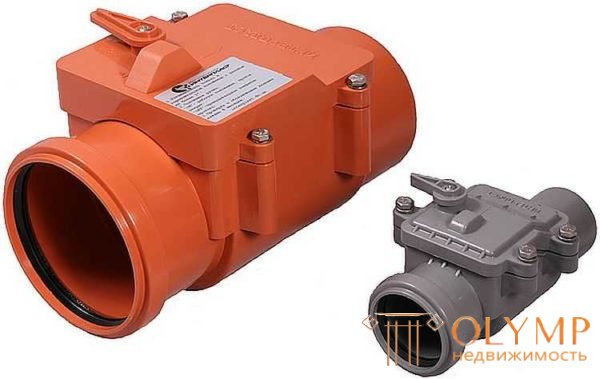
At times, we are confronted with a situation where their contents flows in the opposite direction through sewer pipes. The main reason for this phenomenon is clogging in the sewer. In a private house, this may happen if the well overflows. You can avoid this kind of trouble. It is necessary to put a check valve on the sewer. This simple, but effective device completely blocks the return stroke of drains.

For different pipe diameters
The contents of the article [Collapse]
The purpose of the check valve for sewage is to shut off the flow of fluid going in the opposite direction. In this regard, the main area of application emerges - the apartments of lower floors in high-rise buildings, especially in the houses of old buildings.
In high-rise buildings, owners of apartments on the first floors very often have problems with toilet bowls, from which the contents of the sewage flow. A blockage usually occurs somewhere in the “sunbeds” - horizontal pipes in the basement. Then all the content rises through the pipe to the first branch and pours out through the first accessible point - the toilet, spills onto the floor, sometimes even baths and sinks are filled. That is to solve this problem and it is necessary to put a check valve on the sewer. It will cut off the return flow going to your apartment. True, the problem will appear to those who live on the floor above - fecal water can even go up there. Then they will also have to put a return sewer valve. Above this level, the effluent column usually does not rise — it forces a cork, everything goes away.
However, residents of high floors should not be happy - they may suffer as well. Sometimes blockages happen somewhere between floors. It comes mainly because of violations of the rules of sewage - someone lowers objects that should not be there, they get stuck, a traffic jam is formed. In this case, they can “flush” the toilet bowls on any floor - depending on where the blockage has formed. So on any floor, except the last one, it makes sense to put a check valve to put - “just in case”.
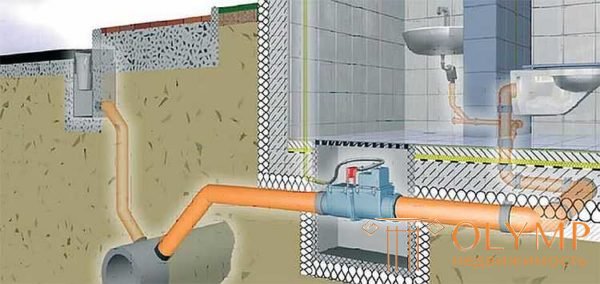
Installation example in a private house
The third group of consumers - the owners of private homes. In principle, the sewage system of a private house should be designed so that the return flow of the drains is impossible. Even so, many people prefer to play it safe than to rake the foul-smelling “treasures” out of the house. The check valve on the sewer in a private house also performs another function - it prevents rodents from penetrating through the sewer pipe and other living creatures.
The main task of the check valve is to block the flow going in the opposite direction. To do this, in these mechanical devices put a movable barrier. The basic principle of operation is that the mechanical damper is lowered in a quiet state, blocking the lumen of the sewer pipe and preventing it from passing backwards. When drains appear, it rises (moves aside), drains go away, and it closes again. By the form of this barrier and the principle of its work, this equipment differs.
In the sewer valves of this type installed spring-loaded round membrane (plate). If the stream moves in the "right" direction, it turns, rising up does not prevent the sewage from leaving. If the movement begins in the other direction, the membrane (plate) is pressed against the rim inside the valve, tightly and tightly blocking the lumen of the tube. Some models have a manual shutter. This is the second membrane, which can be controlled using a button mounted on the housing.
Because of the shape of the membrane, such shut-off valves are also called petal-type valves, and sometimes you can hear the term “slam-downs” - this is because of the way of work — the membrane slam if there is no drain.
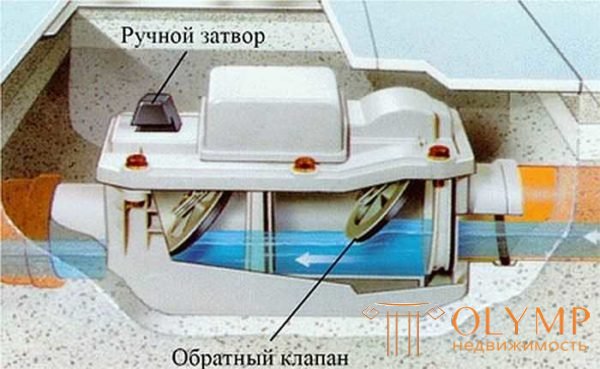
The figure shows how the check valve on the sewer
The device itself is larger than the pipe on which it is installed. So in the pipeline there is first an expansion, and then a narrowing of the lumen, and these are potential places of formation of blockages. In order to quickly eliminate blockages, a removable cover is made in the upper part of the check valve body. By removing her problem you can quickly fix it.
This type of locking device to the sewer pipe is so named because with the passage of drains in the “right” direction the locking element rises. The drains put pressure on the overlapping plate, squeezing the spring that rises. No drains - the spring opens, the passage is locked. When entering drains "from the wrong" side, there is no way to open the passage. This is achieved by a non-linear hull shape.
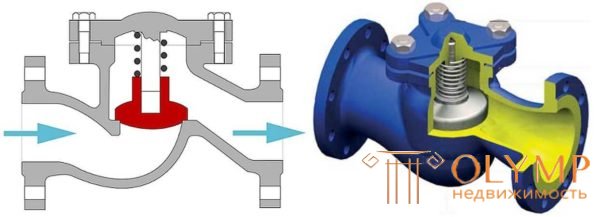
Scheme of the device lifting the sewer valve
The lift check valve is more reliable, but its design is such that it is often clogged and requires periodic cleaning. What it is necessary to remove the cover (unscrew the four bolts), clean or replace the mechanism.
Another option for the locking device in the check valve is a ball. In these devices, an important role is played by the internal structure of the hull. The upper part of it is designed so that when passing through the drains the ball rolls into a special recess in the body, opening the passage.
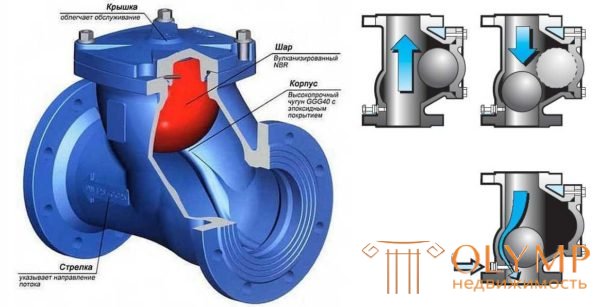
The structure of the ball check valve on the sewer
When the pipe is dry, it overlaps the cross section, when the flow passes in the opposite direction, blocks the lumen of the pipe. The main disadvantage of this design is the leakage of drains during flooding - the ball and the side wall of the body do not always fit perfectly, which leads to the fact that some of the drains still leak out. But the mass flooding and the geyser from the toilet will not be accurate.
What is needed in the sewer air valve and how to put it read here.
Many people like this type of check valves more because of their tiny size. This is a very small cylinder, inside which a butterfly valve is installed. It may consist of two parts that are attached to the central rod, and it may look like a small plate, in one place attached with a spring to the wall of the case.
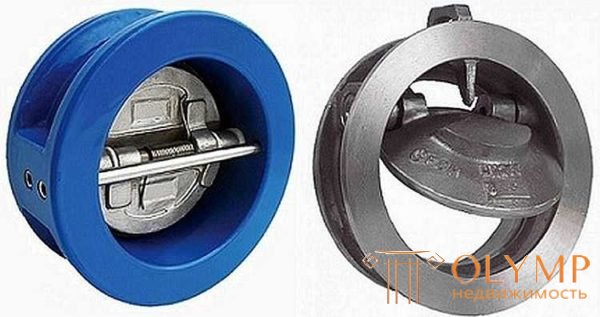
Wafer Type Check Valve
Despite its compactness, it’s better not to put this type of check valve on the sewage system: it’s plumbing equipment and it will work poorly in the sewage system. The second disadvantage is the impossibility of quick cleaning - the design is such that you can only get to the valve by disassembling the connection.
The most common check valves for sewage are made of plastic (PVC) and cast iron. If you have plastic sewer pipes, it makes sense to put the same valve, selecting it in size. Exactly the same situation with cast iron. The point is not that the materials do not resemble, but the need for additional adapters that make the design even more cumbersome.
According to the method of installation, the shut-off valve on the sewer can be horizontal and vertical. Choose a type depending on an installation site. It is put necessarily the same diameter as the pipe, restrictions are not allowed. Accordingly, for each size there is a valve. Some parameters are listed in the table.
| Name / Manufacturer | Diameter | Body / Flap Material | Application area | Price | Notes |
|---|---|---|---|---|---|
VIEGA / Germany 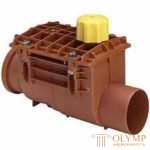 With two valves | 110 mm | polypropylene / polypropylene | Outdoor sewage | $ 150 | Two flaps, the second with manual locking |
CAPRICORN / Poland  For domestic sewage | 50 mm | polypropylene / polypropylene | Domestic sewage | $ 25 | Single valve |
Mc Alpine / Scotland 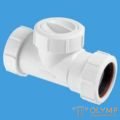 Simple design | 32,40,50,90,110 mm | plastic | Internal wiring | $ 11-21 | It has small dimensions. |
Capricorn / Poland 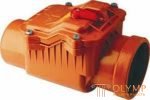 With stainless steel valve | 110 mm, 160 mm | ABS / stainless steel | Universal | 53-84 $ | Emergency manual closing mode |
Ostendorf / Germany  German check valve sewer | 50 mm / 110 mm | PVC / PVC | Universal | $ 13-24 | Emergency manual blocking |
Polytron / Russia  Russian stop sewer valve | 110 mm | Polypropylene | Outdoor installation | $ 14 | Emergency manual blocking |
Politek / Russia 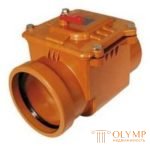 Manufacturer Politek | 110 mm | Polypropylene | Outdoor installation | $ 23 | Emergency manual blocking |
As already mentioned, the check valve to the sewer - the device is rather cumbersome. The flats in the apartments are usually small, it is difficult to find a place, but you have to - if you don’t want to have a geyser instead of a toilet bowl.
The exact dimensions of sewage valves depend on the diameter of the pipe on which the device is placed. For example, for a 100 diameter sewer pipe, the minimum length is 40 cm, the height and width are slightly less. This box must be installed before entering the riser.
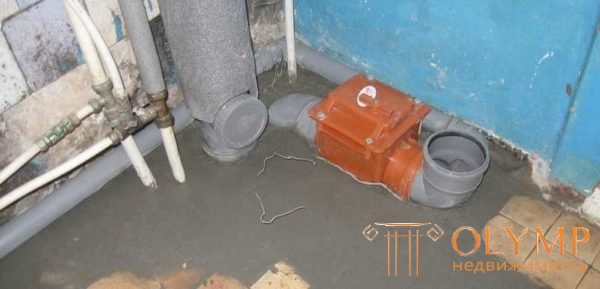
Check valve for sewage installed
In this case, it is often necessary to break the floor, already laid tiles - it is necessary to combine the holes in the housing with the pipes, center everything, follow the required angle of inclination. Such a prospect is particularly “pleasing” if a repair is recently made. In this case, there is also an option - to insert a check valve into the riser above your entrance. But for such works - intervention in the general house system (installation of sanitary devices on your branch does not fall under this category), and they require written permission, you will have to notify residents, turn off the water, representatives of the operating organization or water utility will work. In general, this is still a trouble, because this way of solving the problem is used very rarely.
If there is no space for a common device, put a check valve on each sanitary fixture - separately on the toilet, bathtub, washbasin, sink, etc. This is if pipes from each of the devices go to the riser separately. If you have only two directions - on the toilet, and then on the wash basin-sink, etc., then it will cost you to install two devices - one personal on the toilet (the diameter coincides with the diameter of the outlet) and the second one is common, branch that goes to all other devices. Its size should coincide with the diameter of the pipe wiring, and most often it is 50 mm.
The main thing that needs to be taken into account is the direction of movement of stocks. On the body it is indicated by a large arrow. The device must be rotated so that the normal direction of the runoff coincides with the arrow. Further installation features are as follows:
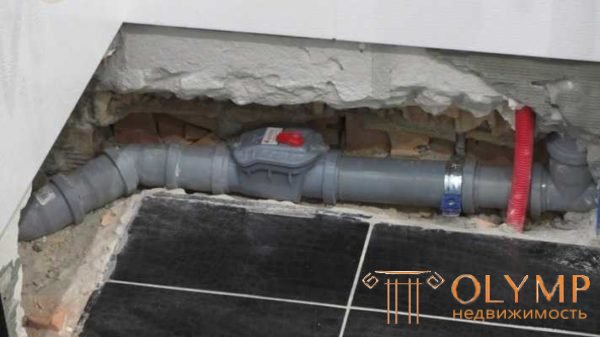
It will be necessary to provide access to the lid - put a removable grill
Что бы оставить комментарий войдите
Комментарии (0)